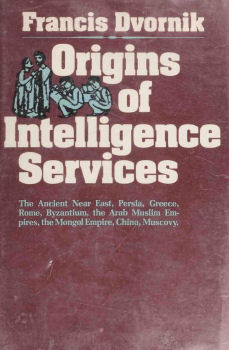Preface
I: Intelligence in the Ancient Near East
Introduction — Egypt and the Hittites — Babylonia and Assyria —
Persian Intelligence and Royal Post Service — Greeks, Hellenistic States,
Ptolemaic Egypt
II: Intelligence in the Roman Empire
1. Republican Period
Lack of Interest in Intelligence in Early Rome and Reasons for
Roman Expansion — Intelligence Service of the Carthaginians, Rivals of the
Romans — Hannibal’s Mastery of Intelligence — Scipio the Younger Learns from
Hannibal — T. Sempronius Gracchus and the Macedonian Relay Service — Cato the
Elder Values the Importance of Rapid Information — Slowness of Republican
Information System — Messengers and Their Status
2. Period of Civil Wars
Roman Traders and Financial Agents in Newly Conquered Lands —
Mithridates of Pontus. His Intelligence in Asia, Rome, and Spain — Cicero’s
Information on Intelligence in Asia — The Pirates and Insecurity of Sea Travel —
Caesar’s Understanding of Military, Political, Geographical, and Economic
Intelligence — Caesar's Information on Gallic Intelligence Service — Caesar
Establishes Information Service by Relays of Horsemen — His Tragic Death
3. Imperial Period
Rise of Octavian-Augustus and Personal Experience in Importance of Intelligence — Founding of the State Post (cursus
publicus) — Oriental Influences on Its Organization — Organization of the
State Post — The mansiones and Changing-Stations— Transformation of the
frumentarii from Grain Dealers to Intelligence Agents — The speculatores and the
frumentarii as Intelligence Agents of the
Emperors — The frumentarii as Policemen and Agents in Persecution of
Christians — The frumentarii, a Roman “Gestapo”? — Their Suppression by
Diocletian — Roman Intelligence from Abroad — Roman and Greek Geographical and
Ethnographical Intelligence — Pliny the Elder and Tacitus — The Information
Service on the limes
III: Byzantine Intelligence Service
1. Byzantine State Post
Innovations by Constantine and Constantius — Theodosius’s
Measures — Functioning of the State Post — Deterioration under Justinian — Its
Collapse in the West
2. Secret Service and Police
The Agentes in Rebus as Military Corps — Messengers, Inspectors
of the Post — Informants, Secret Agents — Organization of the Police in Egypt
and Other Provinces-Police in the Capital and Main Cities
3. Intelligence in the Border Lands and in Enemy Territory
Akritai, Their Duties and Organization — Fire Signal System,
Achievement of Basil II—Byzantine Spies — Constantine V Betrayed by the Bulgar
Khagan Tzeleric — Successful Byzantine Counter-espionage in 877 — A Secret
Agent’s Message in 913
4. Military Intelligence
Byzantine Standing Army — Provincial Army in the
themata —
Army Scouts — Naval Intelligence — Military Police — Intelligence on New Nations
in Military Treatises
5. Diplomatic Intelligence
Priscus’s Report on Hunnic Embassy — Persia. Byzantium, and
Turcs, and the Control of the Silk Road to China — Cherson, Diplomatic and
Information Outpost-Information Center in Constantinople. Reception of Foreign
Embassies-Reports of Embassies from State Archives, Main Source of
Porphyrogenitus’s Work on the Administration of the Empire
IV: Intelligence in the Arab Muslim Empires
1. The Patriarchal Period and the Omayyad Empire
Rise of Muhammad — The First Caliphs — Persian and Byzantine
Traditions in the Administration — Efforts to Replace Byzantium — Réintroduction
of Intelligence Service by State Post — Use of Secret Police — Nationalization
of the Administration, Further Conquests, and Fall of the Dynasty
2. The Abbasid Muslim Empire
Equality of Muslim Races, Awakening of National Sentiments,
Golden Age of Arabic Literature — Last Attempt to Conquer Byzantium —
Reorganization of the Post by Harun Al-Rashid, According to Main Sources — Six
Main Postal Roads — Organization of the Barid (Post), According to Kudama —
Postmasters in the Espionage System — Arabic Police — Post by Carrier Pigeons —
Disintegration of the Caliphate — Intelligence Service and Propaganda by the
Fatimids— Intelligence Service during the Seljuk’s Protectorate
3. Intelligence in the Mamluk Empire
Baybars Becomes Sultan — Al-Omari’s History
of Arab Post in His Al-Tarif — Al-Makrizi’s Description of Baybars’s State
Post — Postal Roads Described in Al-Tarif — Baybars’s Post by Carrier
Pigeons — Al-Malik-al-Nazir’s Reforms — Transport of Snow by State Post —
Decadence of the State Post Service and of the Mamluk Empire
4. Arab Intelligence on Byzantium
Christian Spies in Arabic Service — Byzantine Deserters, Arabic
Security Measures on the Frontier — The Strategus Manuel — Al-Mas’udi on
Exchange of Prisoners — Al-Mas’udi’s Story on Muawiya’s Revenge of Mistreatment
of an Arab Prisoner — Arab Prisoners in Constantinople, and Their Information —
Embassies — Arabian Geographers on Byzantium
V: Intelligence in the Mongol Empire
The Rise of Jenghiz Khan (a New David?), Military Genius, Author
of the Great Yasaq, Mongol Law Code — Conquest of North China, Manchuria,
and Kuara-Khitai — Jenghiz Khan, Muhammad II, Caliph Nasin — Conquest of
Muhammad Kharizmian Empire — Expedition of Jebe and Sübötäi in Caucasus and
Russia — Jenghiz’s Organization of Intelligence, His Post Service — Chinese Post
— Arabs on Chinese Intelligence — New Mongol Conquest in Europe, Asia, and China — Jenghiz’s Successors and the Post Service —
Western Information on the Mongol Post, Piano Carpini, Longjumeau, Rubruck —
Marco Polo on the Mongol Chinese Post Service — Report by Oderic and the Arab
Batuta on the Mongol Post — Organization of the Mongol-Chinese Post Service
VI: Intelligence in the Muscovite State
Russia under Mongol Rule — Political Growth of the Moscow Grand
Dukes — Reforms of Ivan III — Introduction of a State Post on Mongol Prototypes;
Its Organization — Herberstein and von Staden on the Muscovite Information
Service — Ivan IV’s Reorganization of the Post Service — Treatment of Foreign
Embassies — Opričnina and Secret Police
Index
